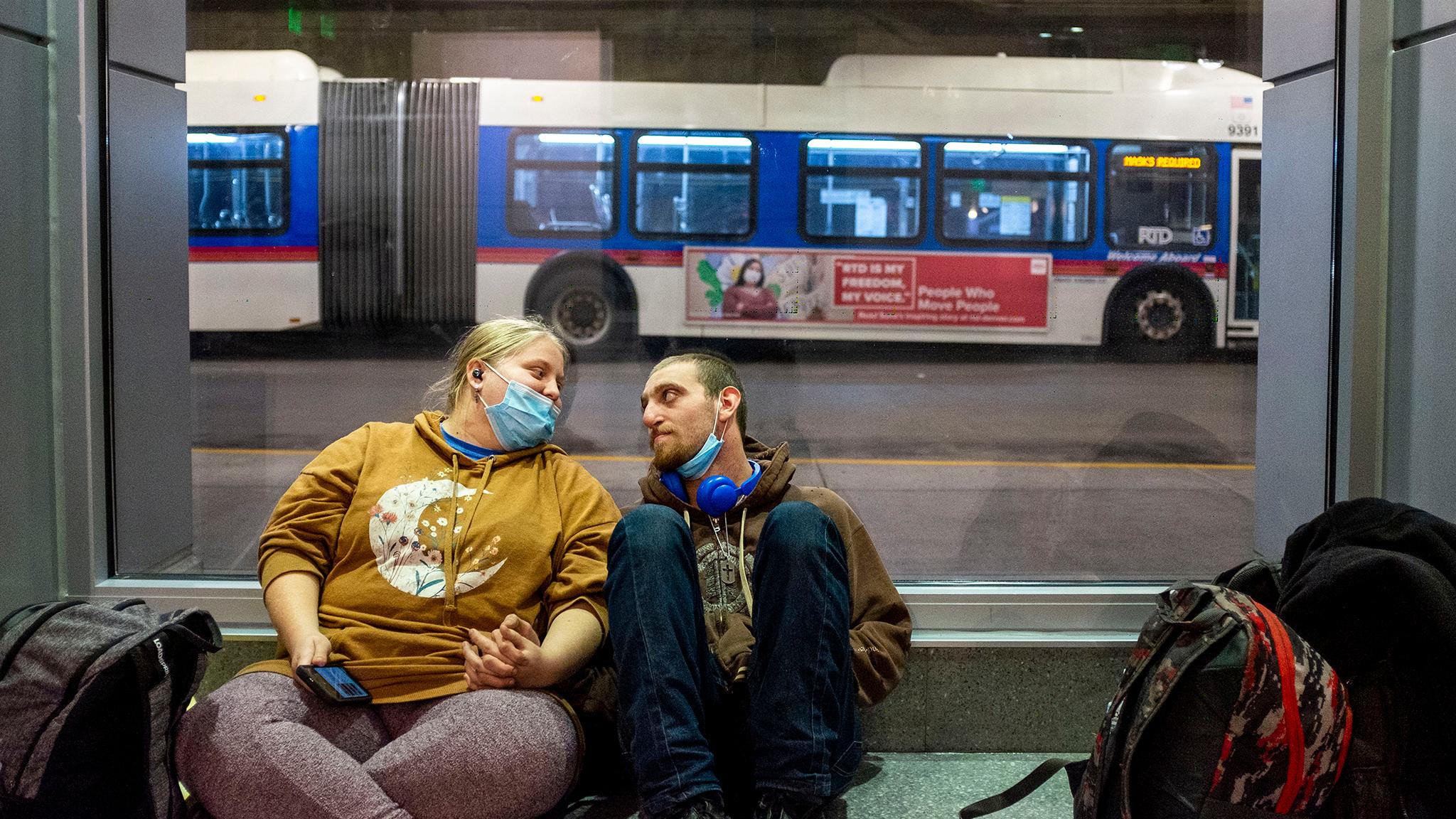People linger at Union Station for many reasons: to catch a bus or a train, charge their phones, connect to wifi, sleep, buy a cup of coffee or a cocktail, or stay at the Crawford Hotel. Many come to enjoy the quiet in the Great Hall, a masterful architectural restoration that has been bustling since it reopened in 2014. Filled with comfortable couches, chairs and desks, the space has been branded "Denver's living room."
Not far away from the Great Hall is an underground bus terminal, where people wait for buses that will take them all over the metro. Many people sleep there; some use drugs.
Last week, Regional Transportation District union president Lance Longenbohn called the terminal "a lawless hellhole" -- a place sullied by "prolific loiterers." RTD drivers, he said, should not be terrified to walk through the station on breaks. Mayor Michael Hancock weighed in with a statement condemning "illegal drug use, public urination and unsafe loitering" at Union Station and announced that Denver police would ramp up patrols of the area and enforce the rules. On Tuesday, RTD president Debra Johnson announced small amounts of fentanyl had been found in the bus terminal restrooms and they would be shut down for a month so they could be remediated and staffed with security.
On Dec. 8, we spent 18 hours at the Great Hall and the bus terminal, talking to people throughout the day and night. Here's what we saw and heard.
5:10 a.m.
It was still dark outside, and many people in the bus terminal were sleeping in the rows of chairs. Four men rested on an old mattress pushed against a wall. The terminal restrooms were gated off.
Kylie Money was awake.
"I just got out of jail," she said. "I don't really want to get back high."
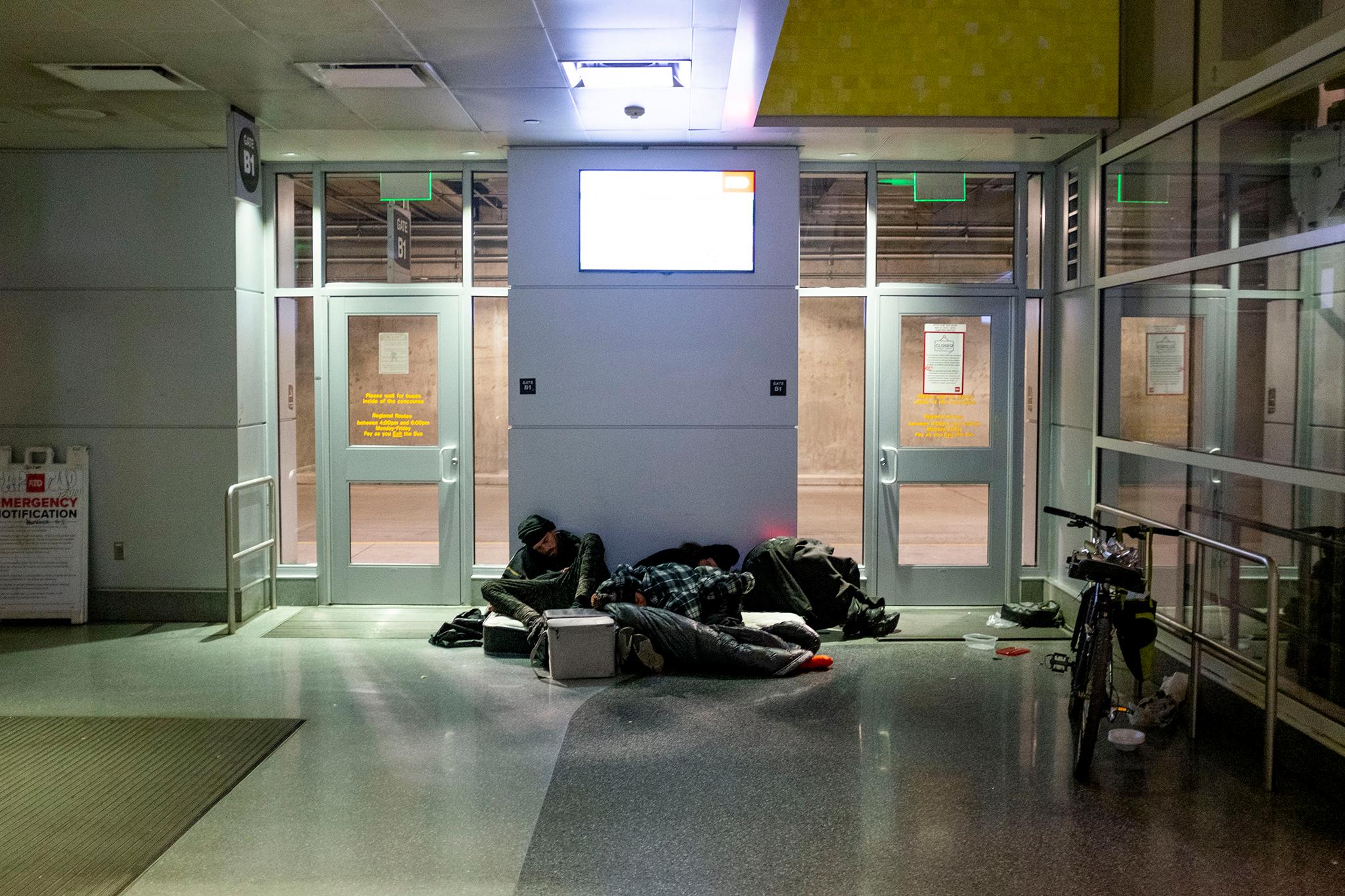
She used to be a dancer, but she said she's been addicted to opiates for 15 years. Now she's worried she'll slip back into old habits. She first got hooked as a teenager, she said, when she found some Percocets her dad left out. Today "little blues," aka fentanyl tablets, are easy to get at the bus terminal, she told us.
Money said she used to hang out at Civic Center Park before the city closed it to remove people and garbage from the grass. Now she hangs around the station. She said she's not completely upset with the city's decision to close the park.
"It's a good thing, though," she said. "I was starting to see young kids there."
Older folks tried to dissuade the kids from following in their footsteps, Money remembered.
"I told them to quit that s***," she said. "It's not even a high. It's not even fun."
Money told us to go talk to a man sitting in another row of chairs across the way. He offered to give us a tour, but he wouldn't share his name.
"First thing is, you don't talk," he said.
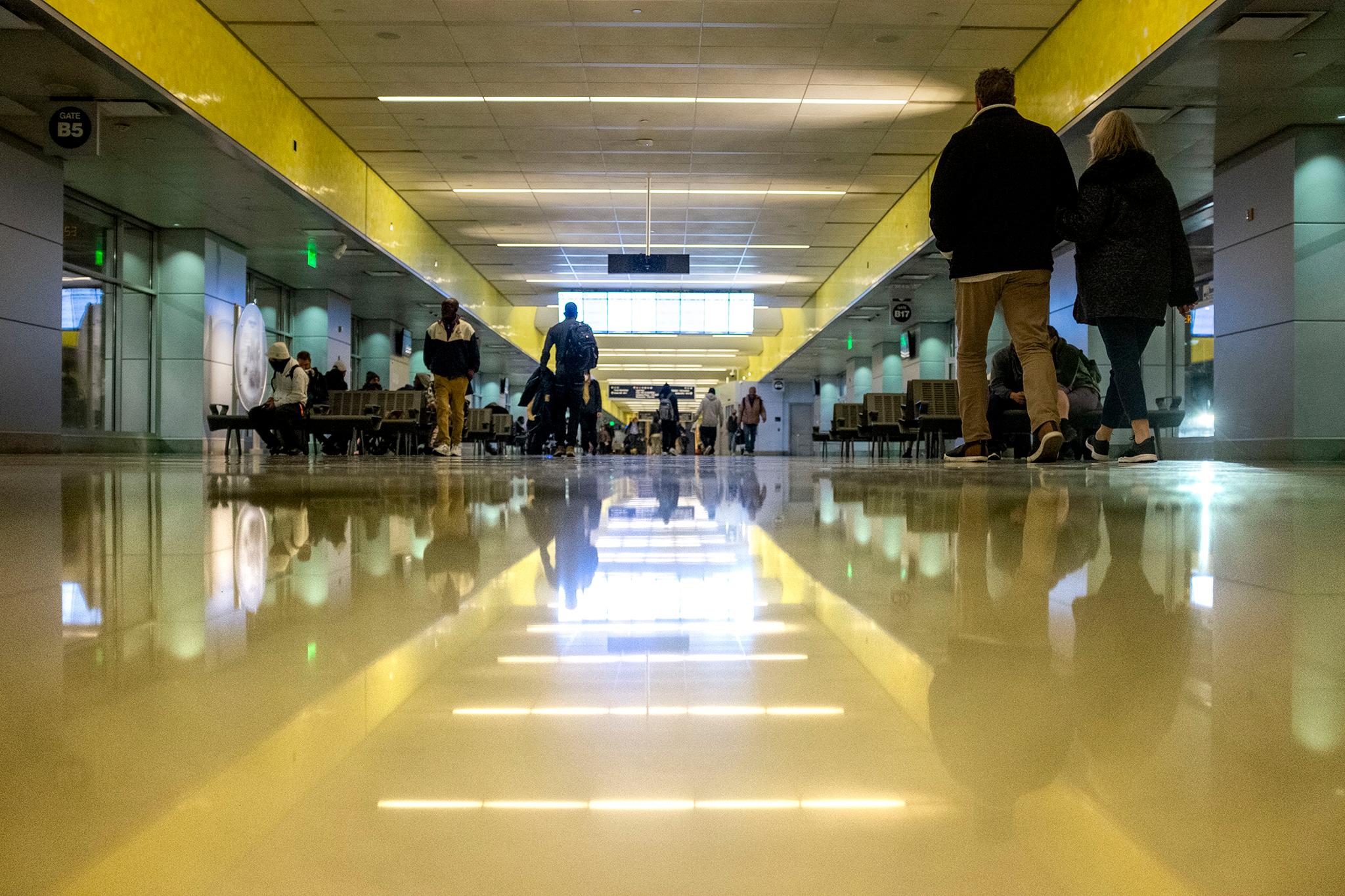
He walked past rows of snoring men. When they woke up, he said, someone would likely be around to sell more blue pills.
"I'm a shot-caller," he explained. "I'm a leader. I earned it by shootings and stabbings and s***, so when I walk around here, people treat me with respect."
A moment later, his hard persona dropped. Another man, awake in a wheelchair, struggled with gauze wrapped around his left leg that ended at his knee.
"I can't feel my legs no more," he said in quiet agony, motioning to a backpack hanging off the chair. "My medication."
The man knelt down and pulled several prescription bottles out of the bag, then handed them to his friend in the chair. As the second man gulped down pills, the first stood and leaned in to kiss his friend on the cheek.
"I'll be back around to check on you," he said. Then he turned to us: "This is life. This is real."
5:35 a.m.
Delores Trimble sat silently by a door as people began to wake up. She said she doesn't think Union Station is a "hellhole."
"I think it's really exaggerated," Trimble said.
Trimble is not unhoused, but she spends a lot of time down here, usually before she catches a bus to Fort Collins to collect mail and take care of other personal affairs. Sometimes she arrives hours before her departure and spends the night in RTD's public seating.
"That's not what I'm seeing down here," she said. "They're not really criminals or drug addicts. They're people who got lost."
Trimble said some of the terminal regulars have been sucked into the criminal justice system and haven't had the resources to find their way back to stability. Whatever brought people to this place, at least one thing keeps them there: "For some reason their families just ignore them," she said.
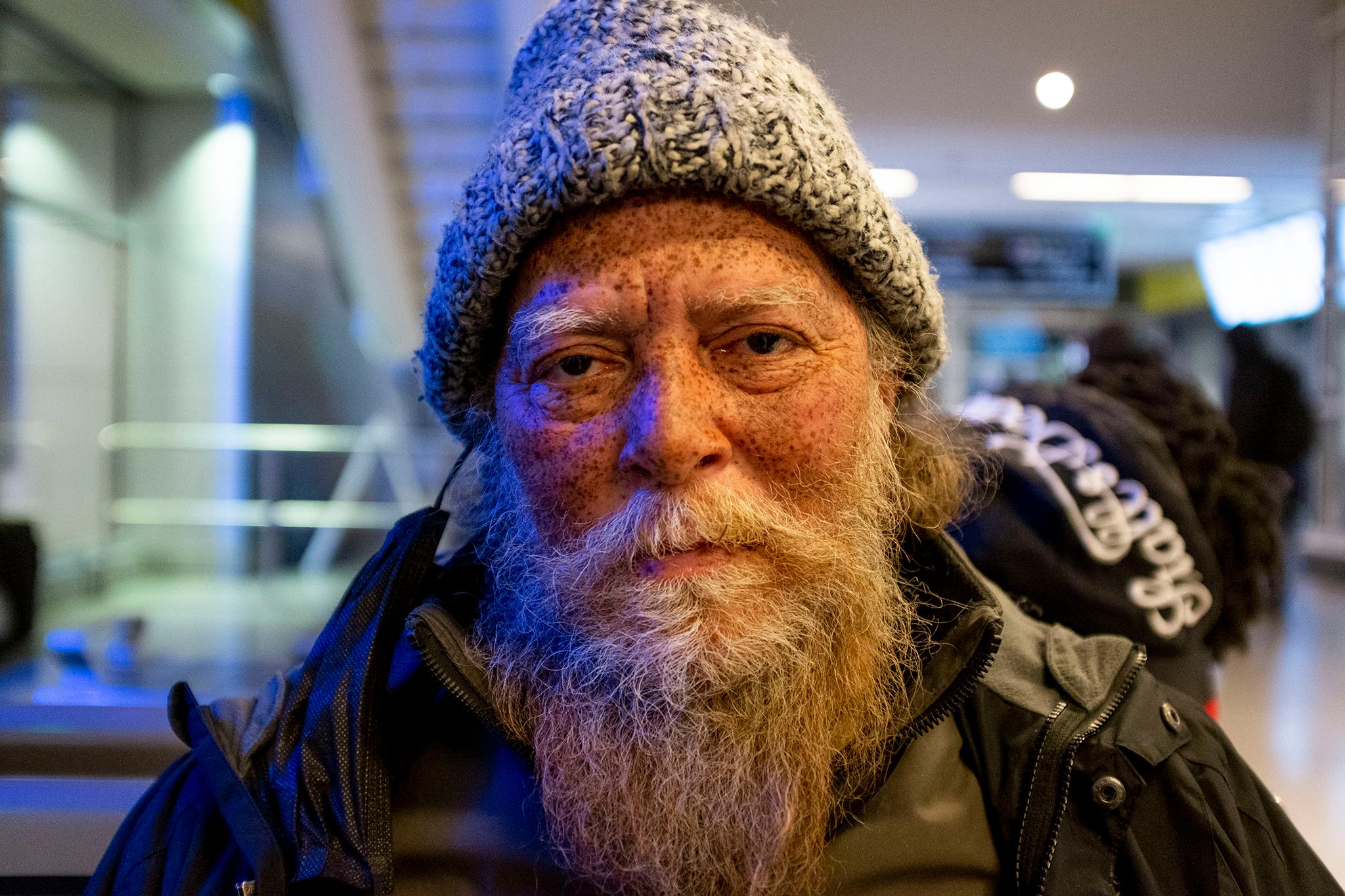
People regularly ask to borrow her phone, which they use to call family for help. Sometimes, Trimble said, she quietly calls mothers and fathers back, urging them to reconnect with their children.
"It's really sad and it's really heartbreaking because this is when they really need you. Right now's the time," she said. "Don't be afraid of them. Don't shut them out because they're on a prescription drug."
She said she hopes the city might bring social workers to the station. She imagines a permanent table set up in the terminal, staffed with people who can offer housing and treatment.
"That's how you fix the problem," she said. "You come down here and you talk to these people and you meet the need."
6:15 a.m.
Upstairs, the Great Hall had been open for less than an hour, and people had already nestled into chairs beneath a massive Christmas tree. Bach played from hidden speakers.
A woman spun across the floor for a photo as a man slept under a blanket on a leather chair nearby. A security guard would soon ask him to move.
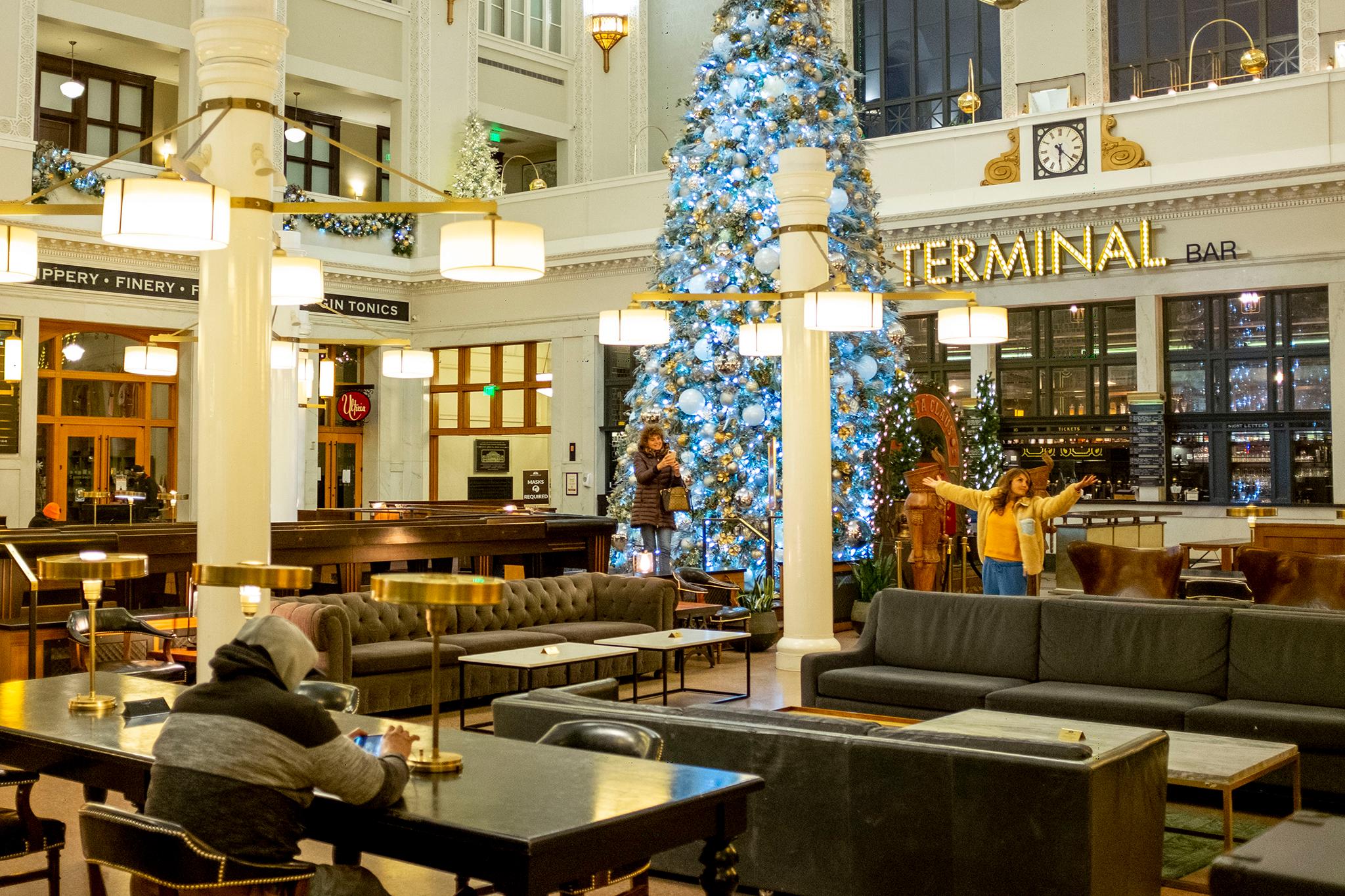
Not long after, RTD security unlocked the doors to the bathrooms, and a group of men made their way to the sinks and toilets. One carried a pillow and a trash bag full of clothes.
Fifteen minutes later, a fire truck and ambulance pulled into the bus depot downstairs. Medics surrounded a man, asking him how long it had been since he last smoked meth and if he'd like a ride to the hospital. One hour ago, he said, and yes.
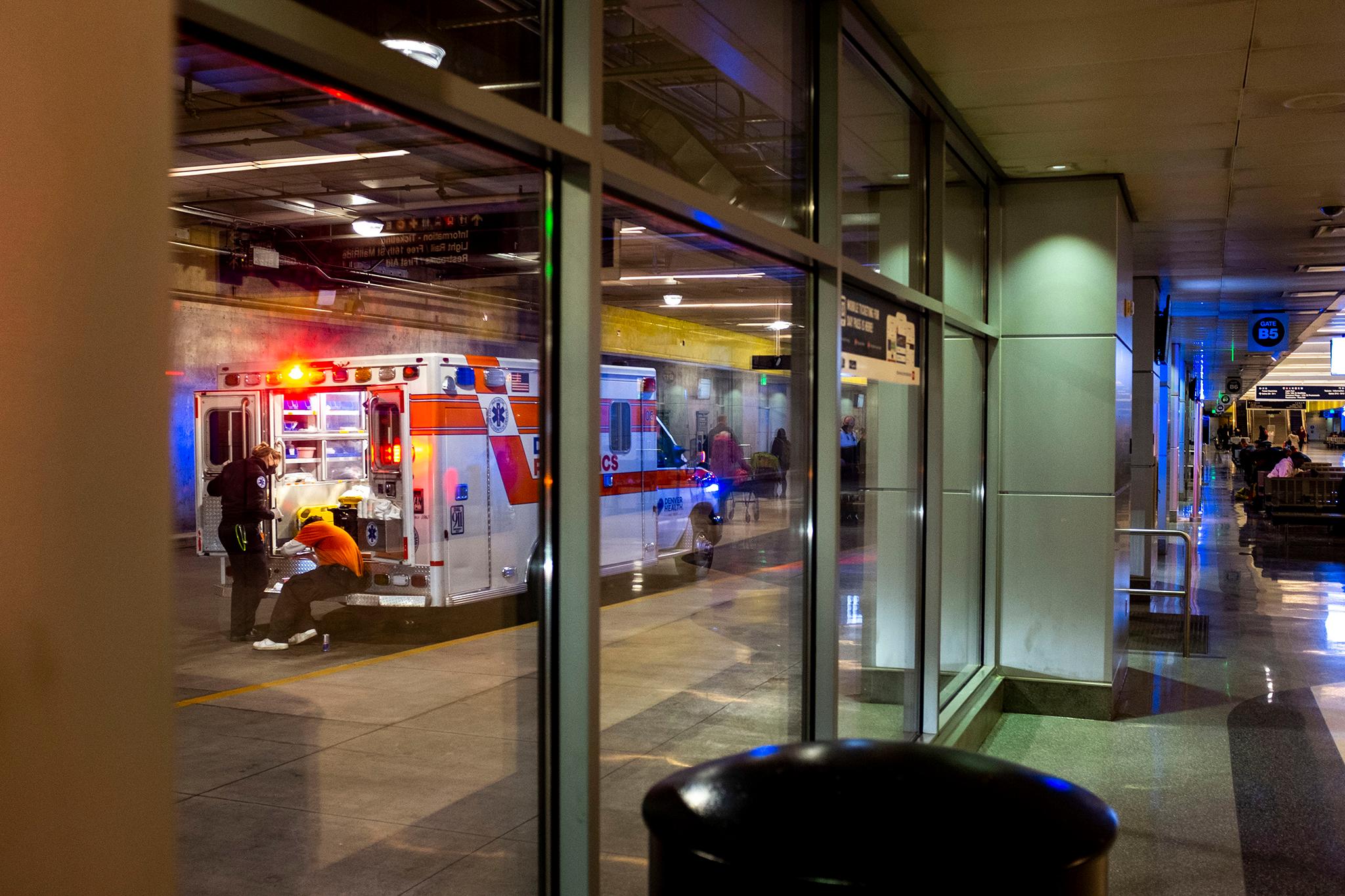
9 a.m.
A couple hours later, a man slept at a table in the Great Hall as a transit cop tried to wake him up. "You need to be awake," she said.
A few seats down, Shawn Foradori played games on his phone. It's a regular part of his morning routine, which starts when he wakes up in a Capitol Hill shelter and ends when he arrives at his job at Ball Arena.
As for the policies people are asked to follow at Union Station, "they're pretty easy rules, actually. Just don't fall asleep," he said. "That guy was probably up all night freezing. What it really boils down to is people don't deserve to freeze."
Foradori has been in Colorado for about three years and has had semi-permanent places to sleep for most of that time. That included his car, until a wreck took that option away. He doesn't love living with men who cram into bunk beds next to him each night, especially during a pandemic. But he no longer worries about waking up on the street surrounded by people looking to rob him, he said.
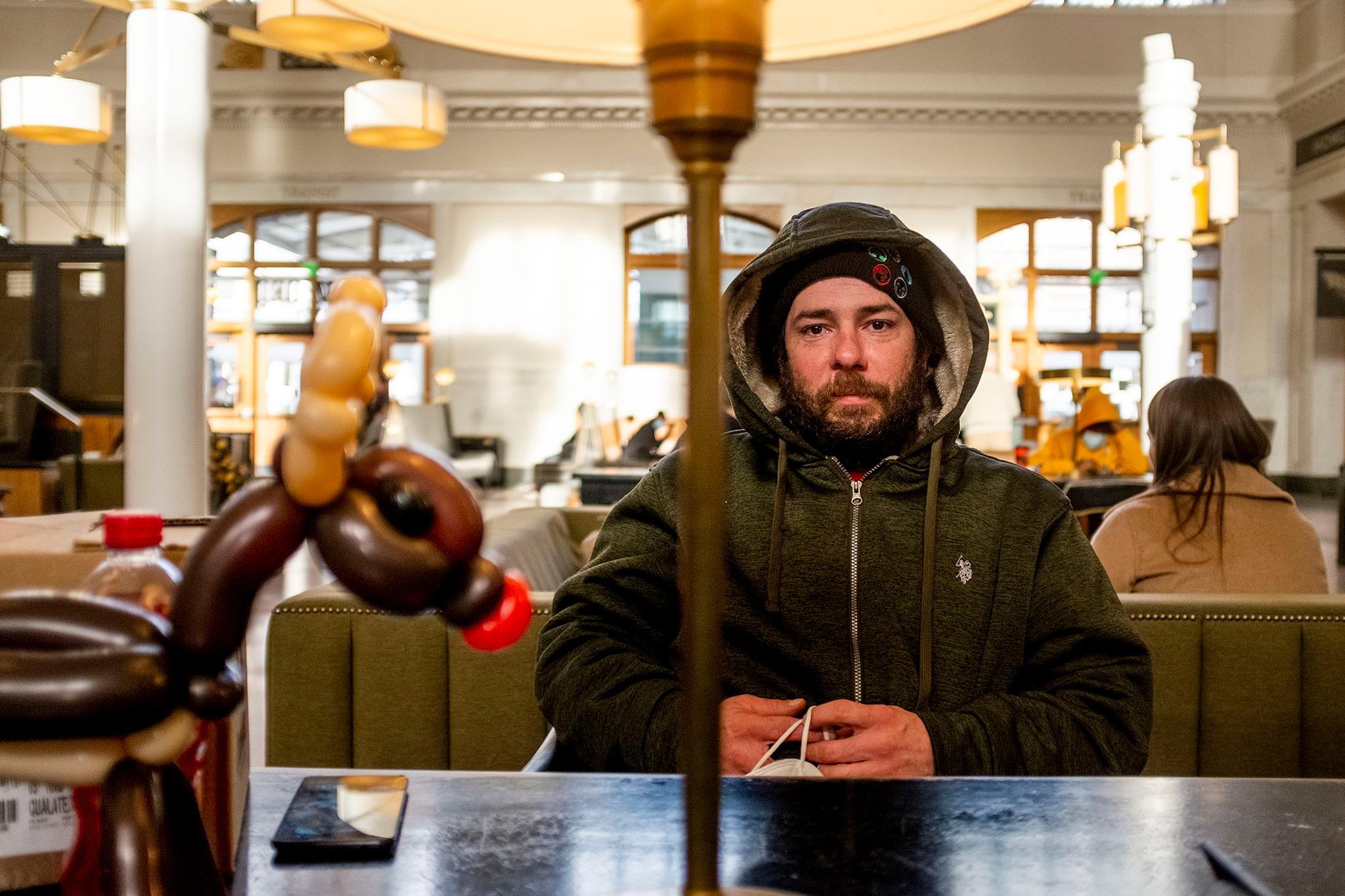
The recent increase in security at Union Station does make for a little more hassle, but so does the uptick of dealers he's noticed around here. Foradori mostly keeps to himself, and he said he can charge his phone and use the bathroom without too much trouble.
Still, he said, station security is dealing with symptoms of much bigger issues, and he doesn't have much faith that anyone in power can solve them.
"I think a big problem with our politicians and people not being able to solve the homeless crisis is because they've never been in the shoes - they've never actually been in the crisis of not having somewhere safe to go, not having somewhere warm to be, not having somewhere to go to the bathroom," he said.
9:30 a.m.
Down the escalator, in the bus terminal, people struggled to sleep as security guards banged their seats, trying to wake them up.
"You've been here all morning," said one of four guards surrounding a hunched-over man. "You've got to go. Come on, dude. Let's go. What are you waiting for? Do you just want attention?"
Two young parents escorted their kids through the terminal. The children looked around, curious about all the sleeping people and the security guards, so they asked their parents what kind of station this was.
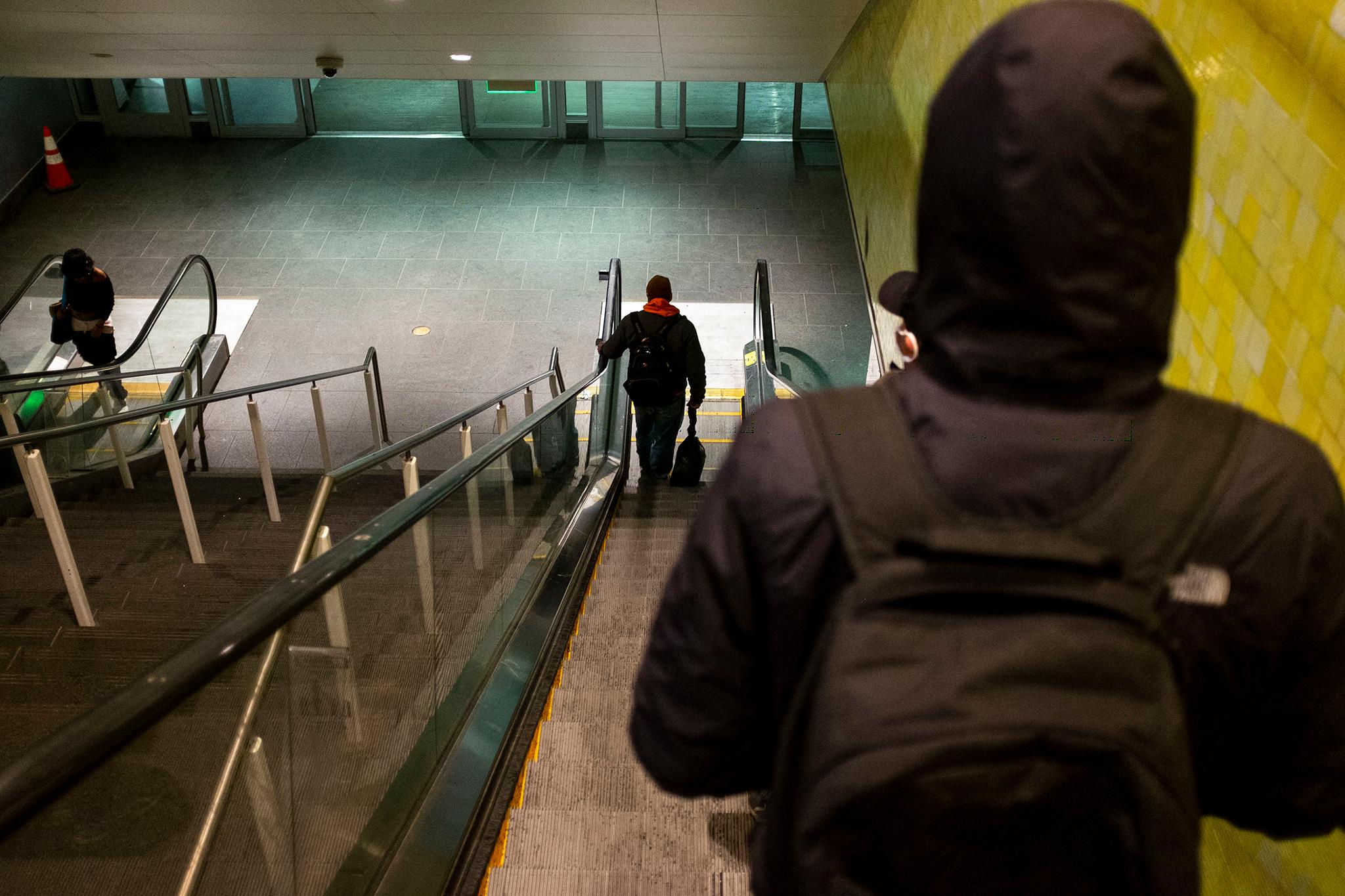
"This is an everything station," the man explained.
As the family walked on, the guards continued trying to move the man: "You're trespassing now. You're not leaving. You've got to leave the building."
Finally the man got up and shuffled out, greeting people along the way, as the four guards followed.
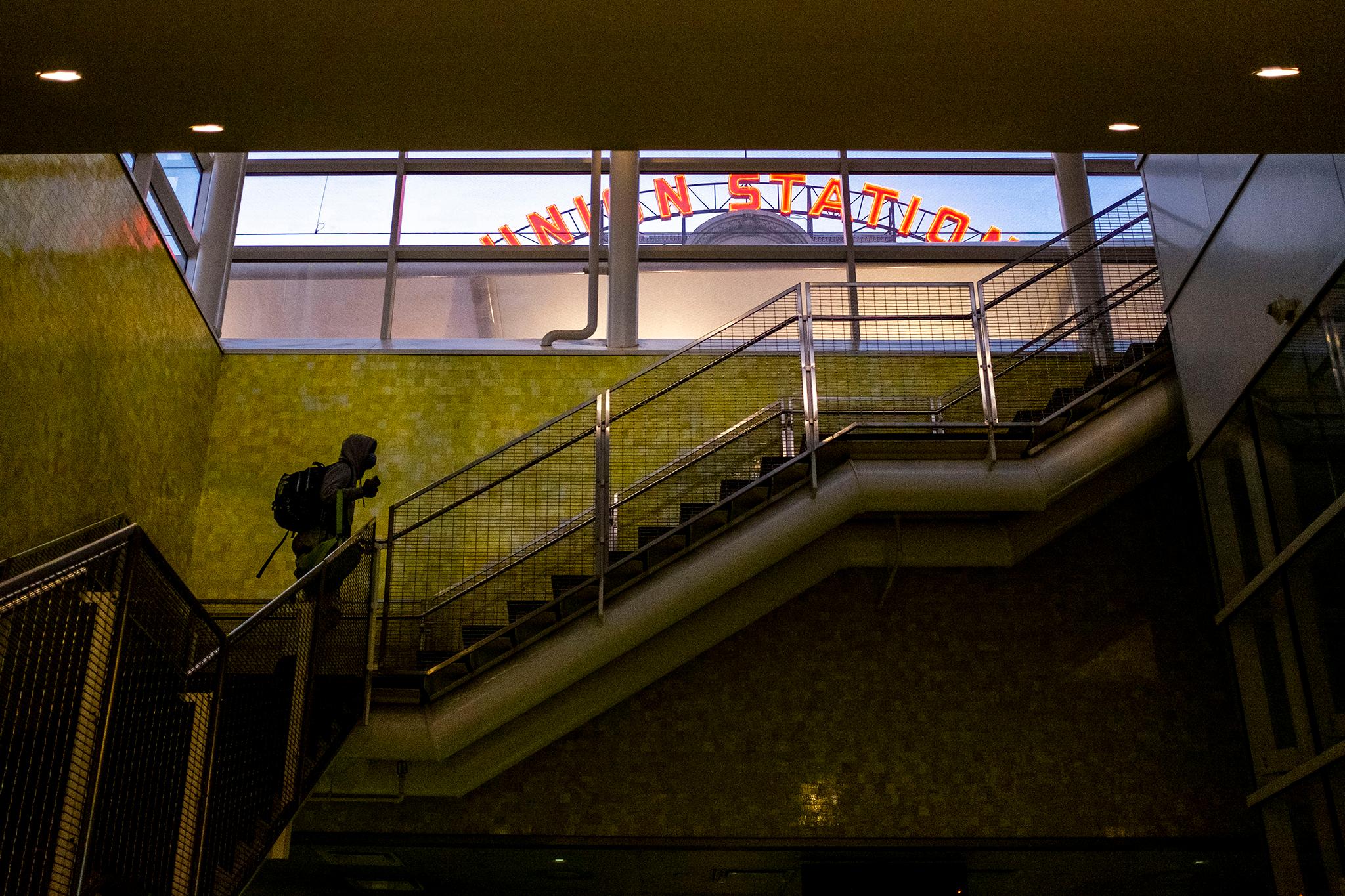
10 a.m.
Kam Donda sat in a cozy chair, staring off into space.
He's been doing the same thing nearly every day since July when his unemployment ran out, he went through a breakup, and discovered he couldn't bounce back as easily as he hoped.
Years ago, when he was living in Chicago, he was able to kick his addiction to heroin. During the pandemic, he said he relapsed.
After he lost his housing, he slept at Civic Center Park. Then the city shut it down. These days, he sleeps in tents around town and occasionally at the bus terminal at Union Station.
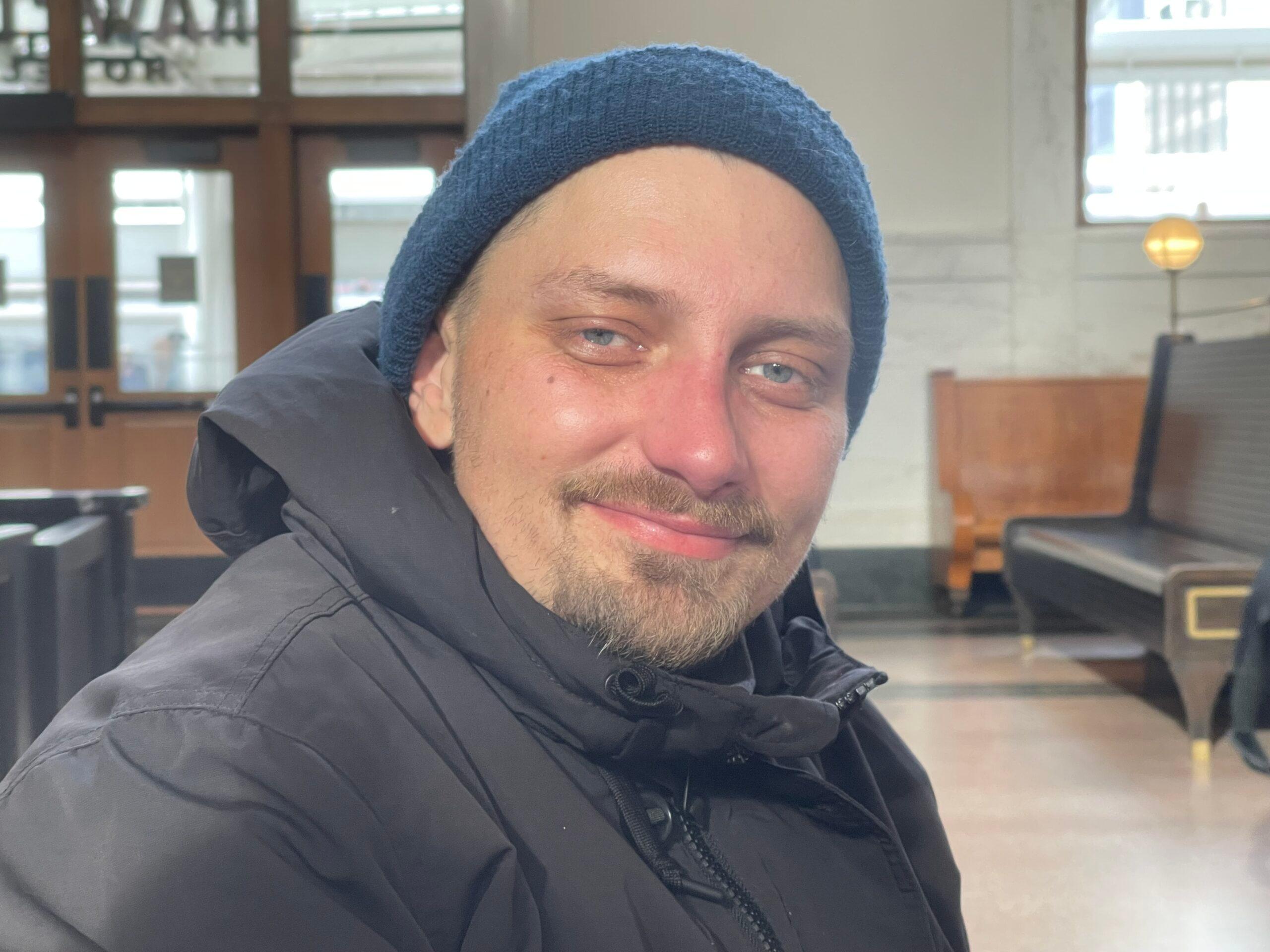
Opioids aren't the same as they used to be, he said. While heroin once gave him a warm, comfortable feeling, today's fentanyl leaves people feeling empty.
Donda described news coverage about claims that Union Station had turned into a crime-infested hellhole as "sensationalized." Yes, people are using drugs in the open in the bus terminal. But they're people dealing with addiction -- not harming others.
Not long after the news came out, he and his friends were resting against the wall in the bus terminal when police approached.
"Denver cops came up to us," Donda recalled. "He goes, 'You guys have seen the news, right?' And we just look at each other. We're like, 'We don't have TVs. We're homeless, man.' He's like, 'Well, let me tell you this. They say this place is a s***hole. You know what? They're right, and we're gonna clean it up. So get the **** out of here, or we're going to arrest everybody.
"The number one thing I've been told I can't do is go to sleep," Donda said.
Yet compared to other spots Donda has stayed, "This place is extremely safe," he explained. It's possible to find yourself in a fight with drug dealers, if you choose to get involved with them. That's what causes most of the violence he's seen.
While he doesn't think it's the job of unhoused people to find a fix for homelessness, he does have some ideas about how things could improve.
"I'm a big proponent of harm reduction," he said, pointing to safe-injection sites that recently opened in New York City, where injection drug users can shoot up away from public spaces and under the supervision of medical professionals who can intervene in the case of overdoses.
He also said he appreciated how the Denver Public Library has social workers on staff who can help people connect with services they need. He worries that too many people who are sleeping at Union Station don't know about the resources available to them.
11 a.m.
Jane Evans, who had just returned to Colorado from Costa Rica, was at Union Station waiting to catch a ride home, to Buena Vista.
She'd been enjoying her time in the Great Hall. Her only gripe: She wished she could try one of the station's restaurants but wasn't hungry.
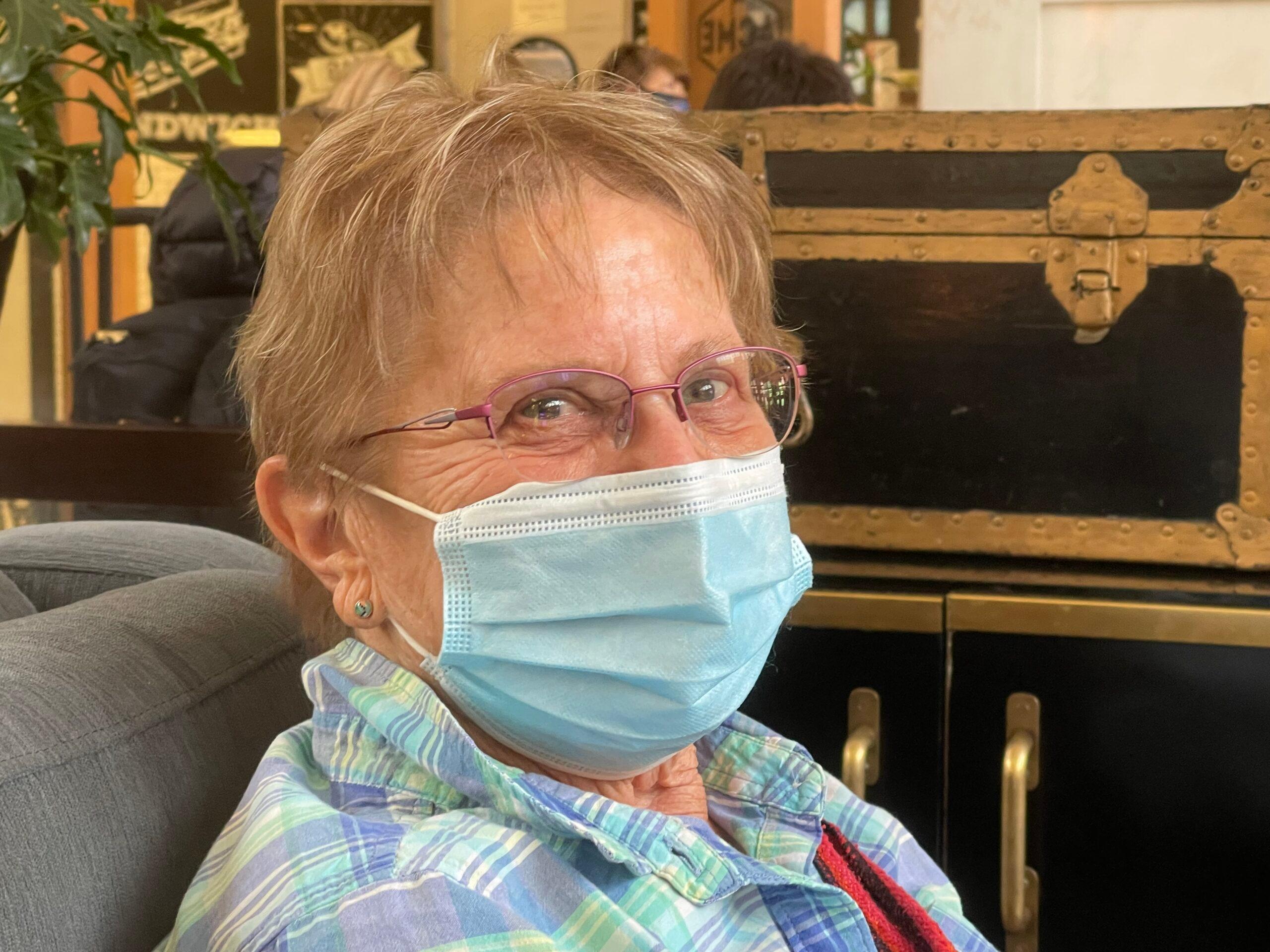
Kyle Harris/Denverite
She's visited bus stations the world over, and while Denver's doesn't compare to some in Europe, she said she's still impressed.
"I love riding the bus, and I love the ambience of Union Station," she said. "It's beautiful here. It's a great place to wait for the bus."
12 p.m.
A man rushed through Denver's living room, shouting at people, telling them to quit listening to their bosses.
Security grabbed him, put his arms behind his back and pushed him outside, telling him to leave or the Denver Police Department would come.
He shouted at the guards, telling them they were violating his civil rights by not allowing him to be inside Union Station. It was a public space, he argued. They could not kick him out.
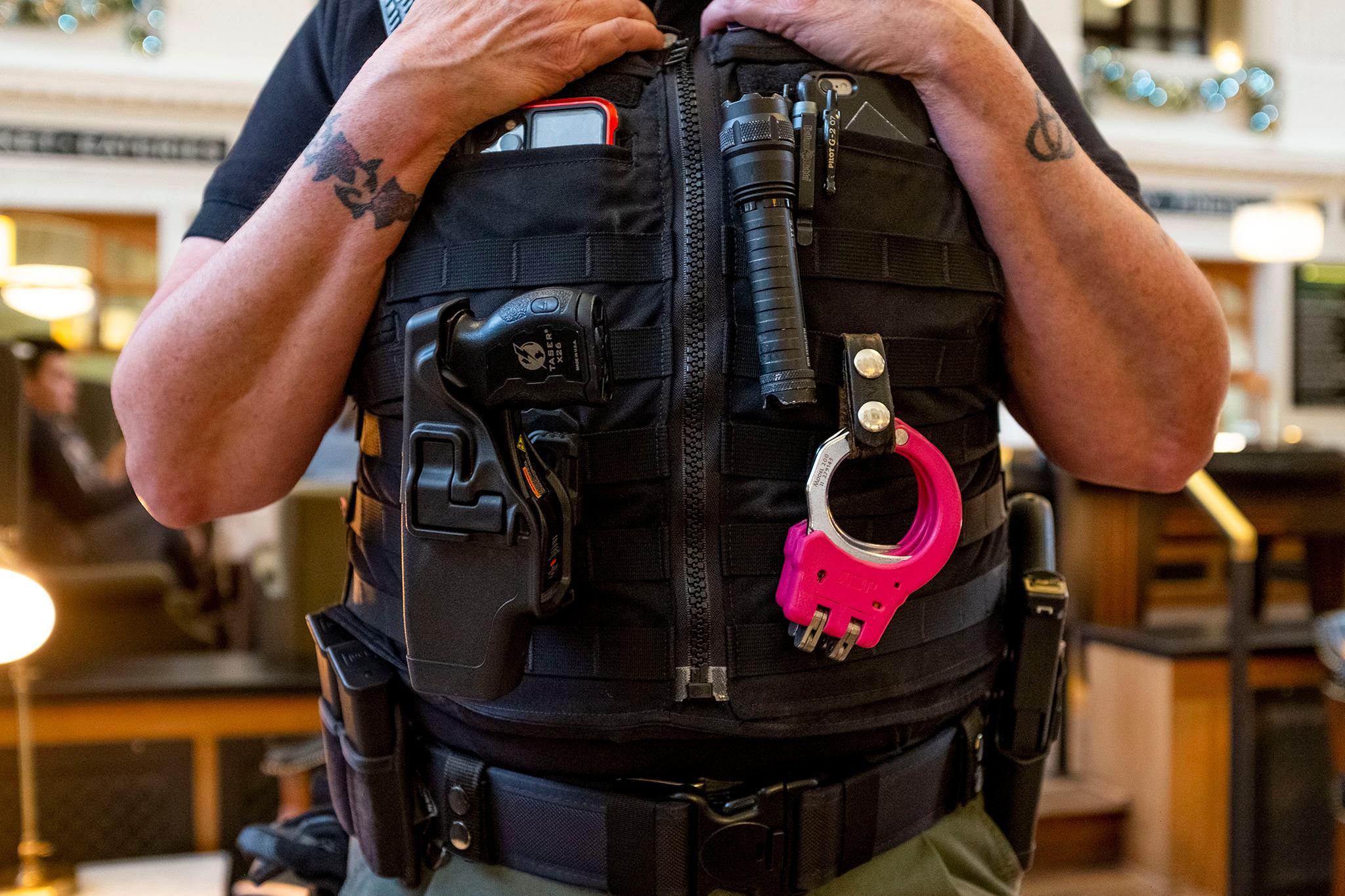
Security shouted back, telling him he was wrong and that they were within their rights to make him leave.
A fight nearly broke out. Eventually, he walked away and had a smoke with a group of friends.
3:30 p.m.
Around mid-afternoon, security began walking through the Great Hall.
They told people that if they were not staying at the Crawford Hotel or patronizing the shops and restaurants that they would have to leave the couches and comfortable chairs and go sit, instead, on wooden benches by the door.
A young man, reading a book and carrying a large backpack, happily complied. He unplugged his phone charger and walked away.
The Union Station restrooms, which had been crowded throughout the day, were also guarded by security. Regulars were surprised by a "customers only" policy. They had lost access to one of the few public restrooms in Denver.
4:05 p.m.
Norvelle White mounted his bike in the bus depot as a new group of EMTs visited with someone in an ambulance parked outside.
White hasn't had a permanent place to sleep for two years. He's been using a tent lately, but he said he spent some time in the emergency shelters Denver set up at the National Western Center during COVID lockdowns. The city has been shutting down those spaces as it gets ready for the stock show to return in January. White said people shouldn't be surprised homelessness is such an issue right now.
"They're kicking us out now, but they're complaining about all the homeless people that's in the street? That don't make no sense," he said. "It's messed up."
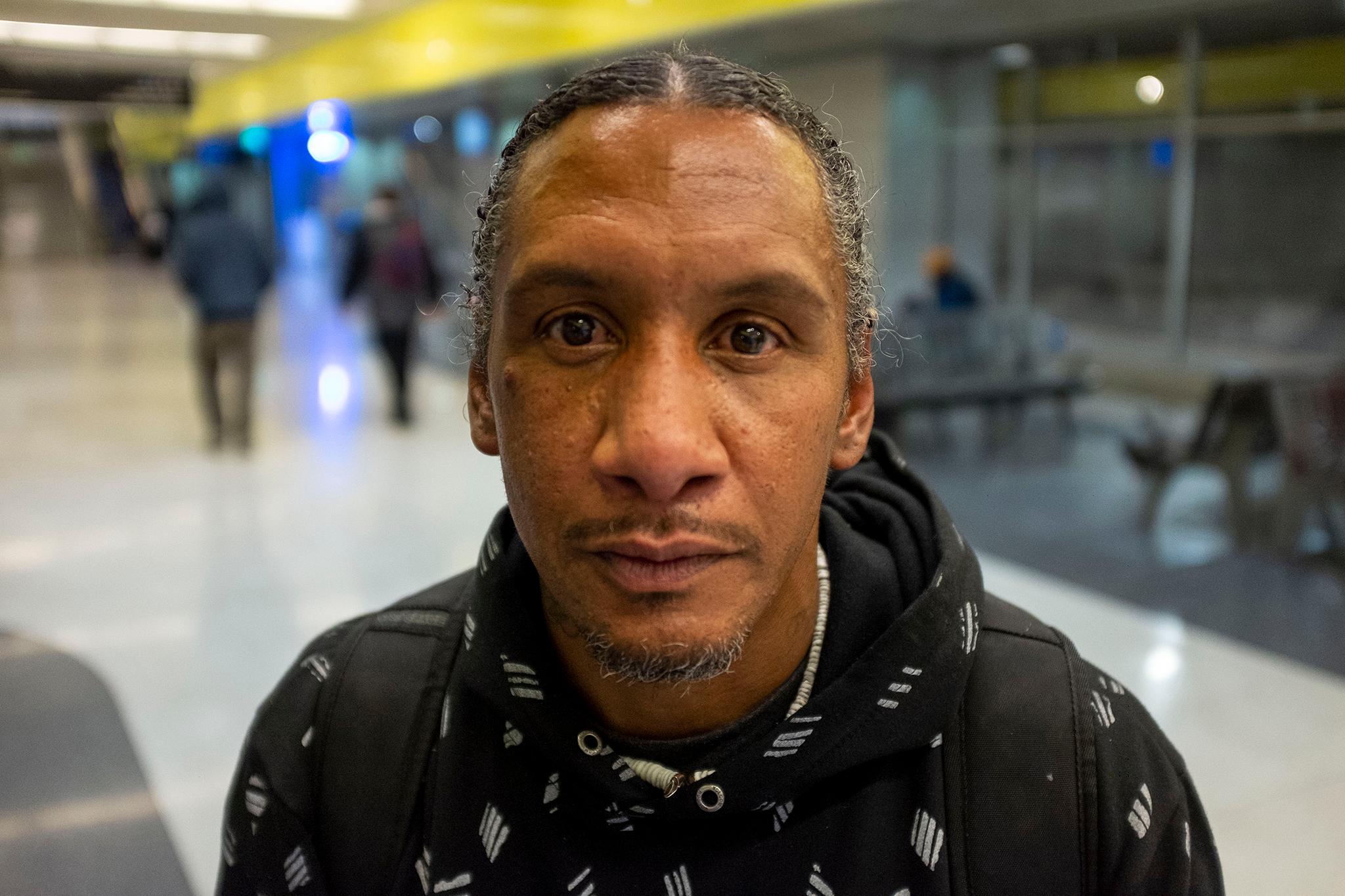
He gets kicked out of Union Station ten or more times every day, he explained. But he's used to it, in part because city workers often sweep him away from outdoor spaces, too.
"We would rather not be here, but this is all we got," he said. "They keep kicking us out of everywhere else."
5 p.m.
As downtown workers were leaving their jobs, a crowd hung around the bus depot's west entrance, by Whole Foods, and security guards and transit cops emerged from the glass doors telling people to break it up. Denver Police Chief Paul Pazen appeared as people began to move on.
"I've been here every day all this week, just to see it for myself," he told us. "It's a very complex situation with not a lot of good solutions."
Pazen knows there's a universe of problems wrapped up in the homelessness and addiction his officers have been tasked to help with here. His mother worked for the Denver Housing Authority, and he said he understands some longer-term solutions need to come from other sectors of government.
He said some recent legislative changes have made it harder to deal with the fentanyl problem. State officials voted to make most drug possession crimes misdemeanors in 2019, and Pazen said that took away crucial tools law enforcement once used to push people toward treatment. Before the law passed, he said, people picked up for possession had the option to go into treatment and avoid formal charges. Or, he said, they could have gone to jail, where there are social and healthcare workers on hand.
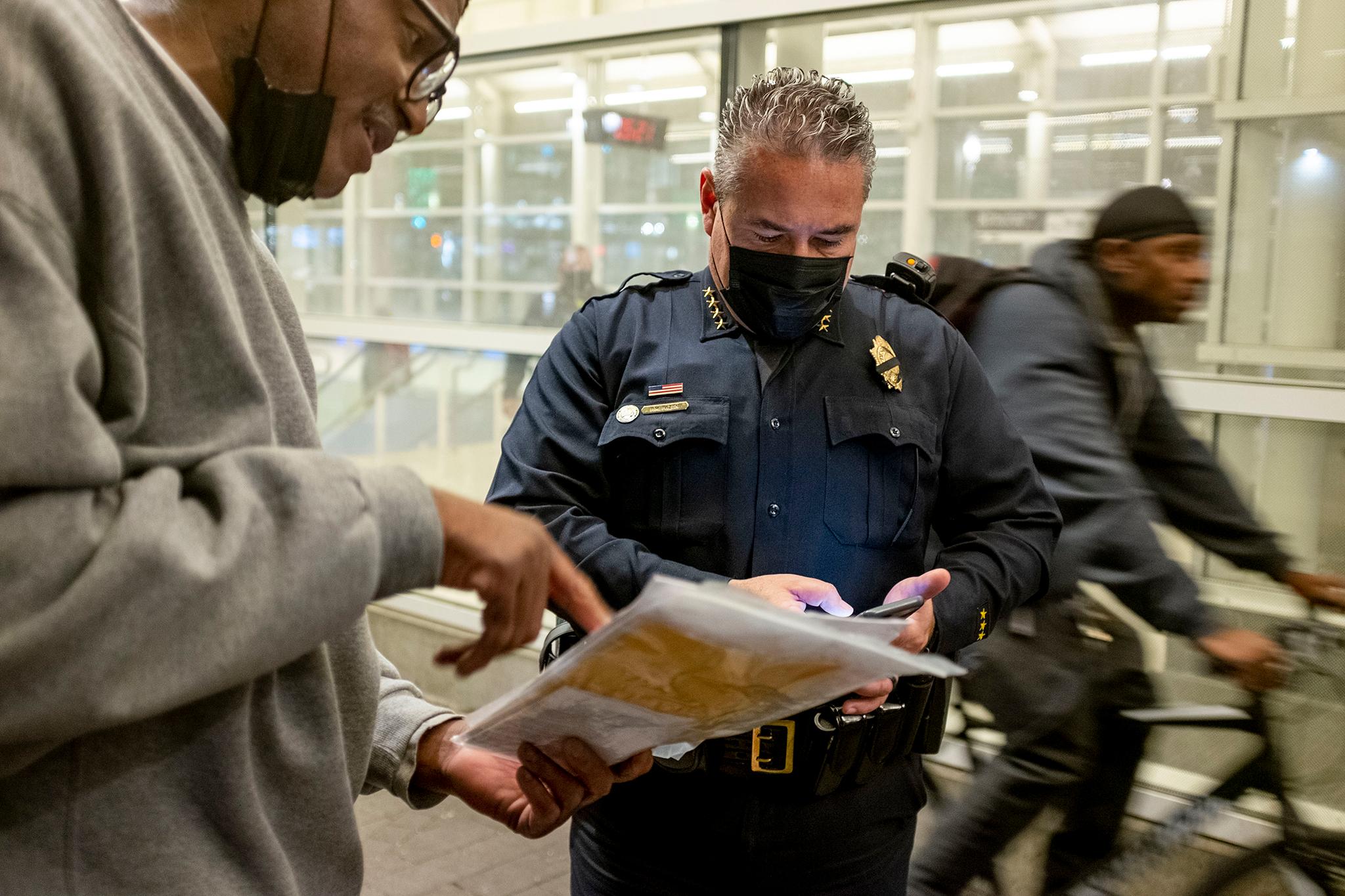
While Pazen thinks backers of the 2019 law were "well intentioned," he doesn't think there's enough incentive to get people to sever ties with their addictions.
He said his department has sent a social worker into the bus terminal pretty regularly over the past few weeks, though nobody so far has accepted help. He described them as "service-resistant," and said "handouts" are making it too easy for people to avoid taking personal responsibility for themselves.
"How are you?" Pazen asked a man who was clearing out of the Wewatta Street pavilion.
"Just trying to make it," the man responded.
"Hang in there," Pazen replied
10:15 p.m.
Two fashionable men, one carrying a kitten, got off the A Line and walked into Union Station.
The couches and plush chairs in the Great Hall were largely empty. A few groups of people were drinking and laughing at Terminal Bar. Security was still blocking the restroom to all but those who said they had patronized the restaurants or shops.
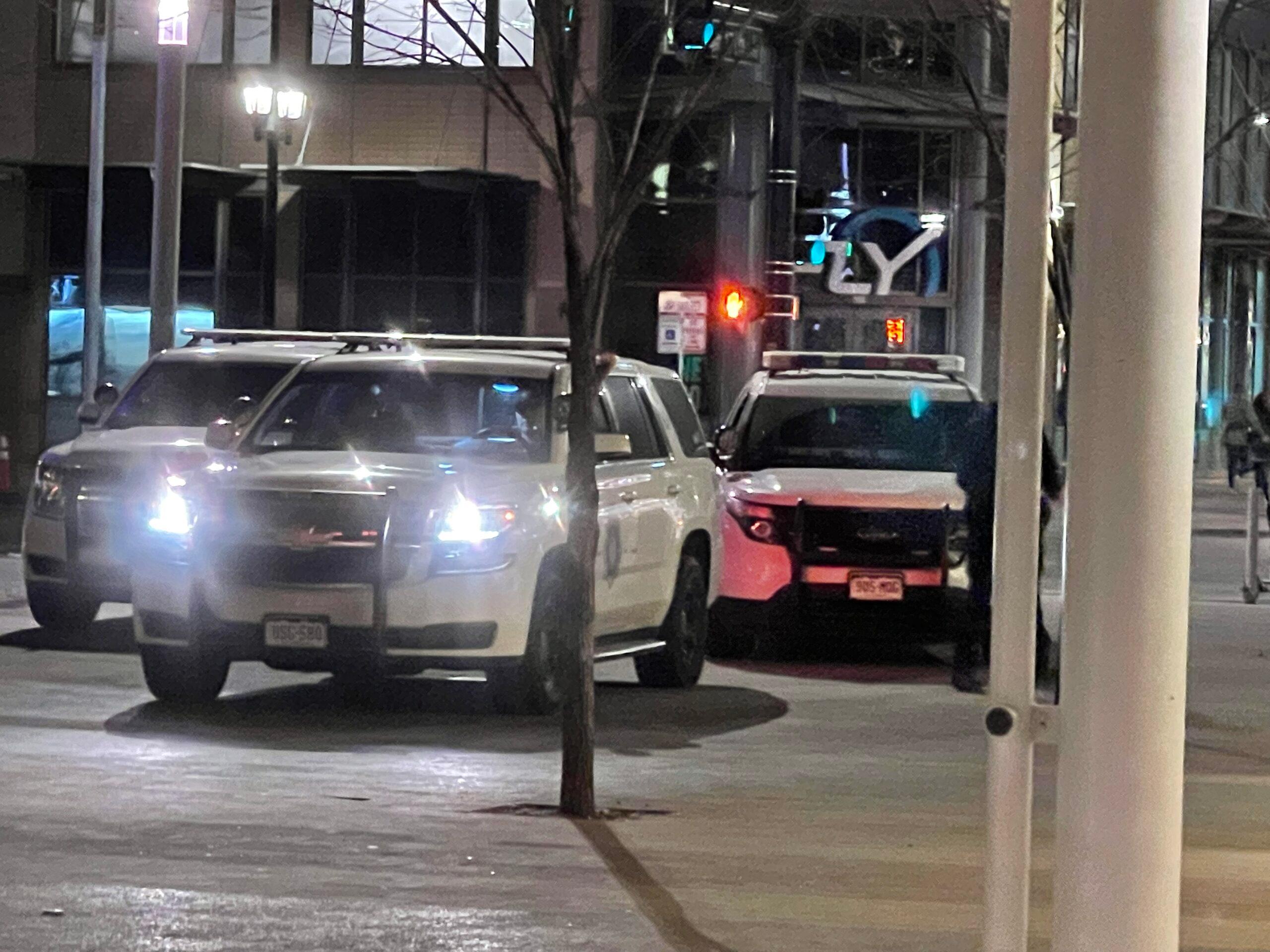
The men from the A Line needed to use the restroom and argued with security over whether they were allowed. Eventually the guard let them in.
After doing their business, they walked outside and down to the bus terminal, where people were still sleeping.
Four police SUVs, with officers inside, were parked above the terminal. Some officers were walking inside with the transit police.
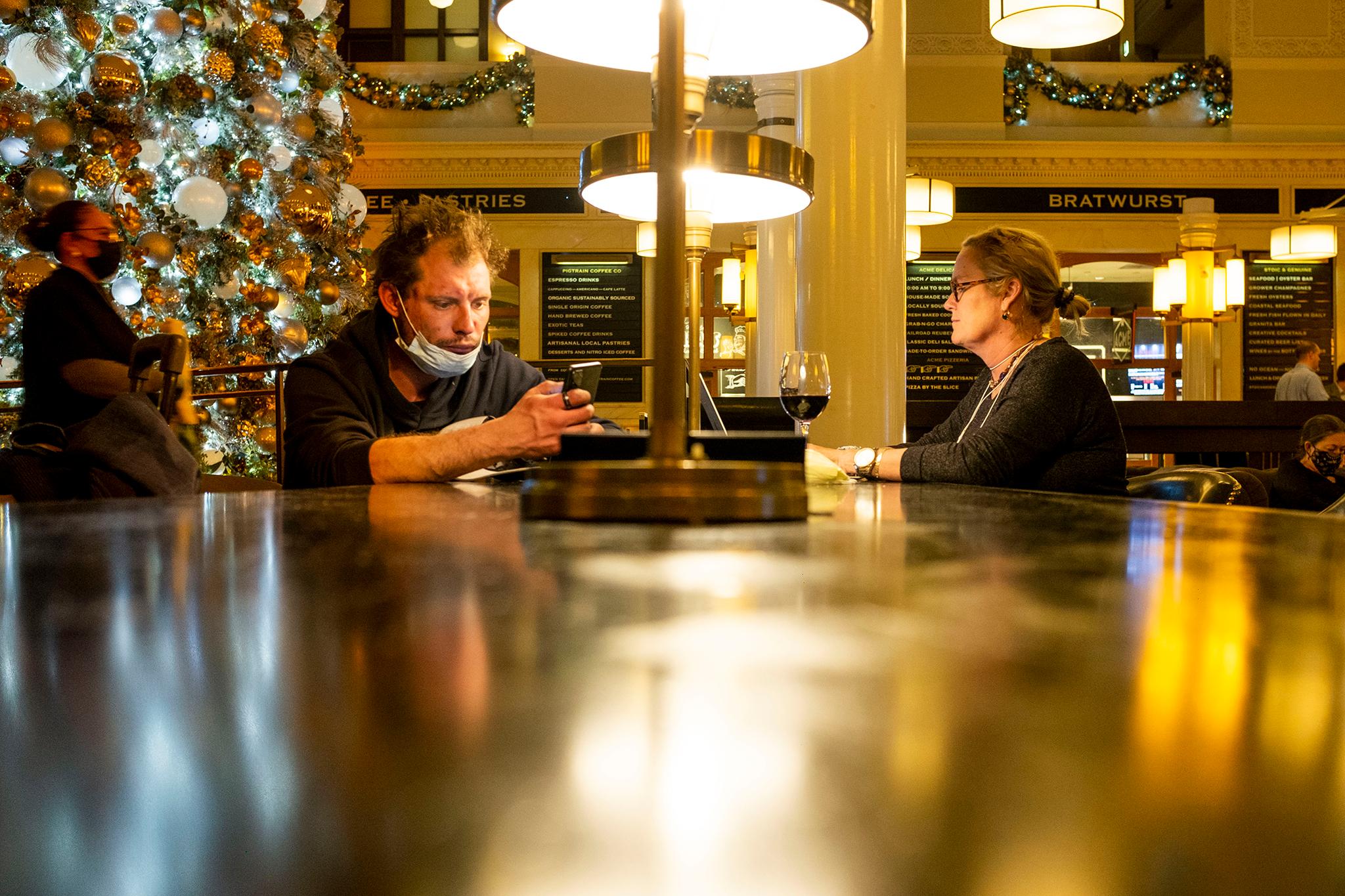
Three guards approached a sleeping man.
"Wake up," one said, smacking the back of the guy's seat. He leapt up, and he and the officers laughed.
"Are you waiting for a bus?" the guard asked.
"Yes," the man said.
"You need to stay awake."
Thursday, Dec. 9, 10:30 a.m.
Foradori texted us that things at the station had changed again. A transit cop told him he'd have to buy something to sit at the table he'd been using for months. He opted not to stick around.
"I went to Starbucks. Last thing I want is to spend money to have the hassle of being in a hell hole," he wrote. "I wouldn't spent money at any of the establishments there until the drug use/dealing is stopped. And it's the same damn story and situation at every bus/grey hound station across America."
